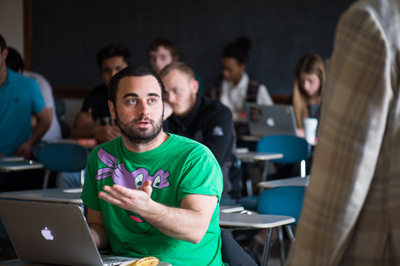"Does the University of Rochester have an undergraduate liberal arts curriculum?"
"No."
"So . . . we choose an area of interest when we come in and study that for the four years?"
"Umm . . . not quite."

Rochester's Open Curriculum
At this point, any prospective student or parent (or even someone I get introduced to in a social setting) asking me these questions starts to get thoroughly confused. That's my cue to interject and tell them about this unique Rochester curriculum and why I've come to love it so much. We're different, and we stand out.
The Rochester curriculum is something that fascinated me when I was applying here. I knew I wanted to pursue a field in the biological sciences, but I did not want to study only the natural sciences all four years of my undergraduate education. I could not fathom studying biology, chemistry, and math for semesters on end. I'm someone who likes a constant change. And that change is good for me. It doesn't let me get stuck in a rut and is constantly putting my brain at a good, challenging pace. Honestly, would you be able to to do the same exercise routine in the gym every single day for days on end?
"He who rejects change is the architect of decay." ~ Harold Wilson

Three Divisions of Learning
With the areas of learning divided into the natural sciences (and engineering), humanities, and social sciences, opportunities to push yourself and expand your knowledge are aplenty. Here at Rochester, we get to pick a major within one of these areas, and then "cluster" (in other words, a set of three courses connected with a common, broad theme) in the other two areas. It was this freedom to do what I love, yet have the guidance in pursuing my core area of interest that was the deciding factor for me.
Unique Combinations of Study
I've come to pick microbiology as a major, with a minor (I started off clustering) in public health and a cluster in Hinduism—it's as diverse as it gets. As a senior, when I reflect on this, I feel an immense sense of pride having been able to accomplish this. I say this because when I look back on the four years, I realize that taking these diverse arrays of classes kept me stimulated. They let me discover what I have to come to love and kept me hungry to keep learning. Every Tuesday and Thursday of my week start with a class on analyzing famous literature and medical narratives with the aim of making us good, empathetic future doctors. I've been given the opportunity to be a part of an up-and-coming field of medicine, medical humanities and narrative medicine, with the idea that by learning to analyze and close-read, we'll be able to use that acquired skill set in the practice of clinical medicine.
I loved English literature in high school, and being able to combine it with medicine, something I want to pursue in the future, is possibly the best thing I could ask for. But the day just gets better. I jump right into a class on the famous Hindu epic, The Mahabharata. Sitting in a classroom nearly five thousand miles away from your home country, learning about your home country and its religion is a surreal experience. It's been an extremely enlightening and humbling journey to see and learn something that you've thought comes naturally to you, but with an entirely different and outside perspective. Tuesdays and Thursdays are the favourite days of my week. My classes change gears so quickly that it keeps me energized and constantly pushing my limits to think beyond.
There is no time to get bored at the University of Rochester. There is freedom and plenty of room to follow your dream(s) and passion(s). Yes, it's all right to have multiple dreams and passions. The clock's ticking and you have to learn as much as you can . . . but more than that, you have to grow from all that learning!
“Education is the most powerful weapon which you can use to change the world.” ~ Nelson Mandela

